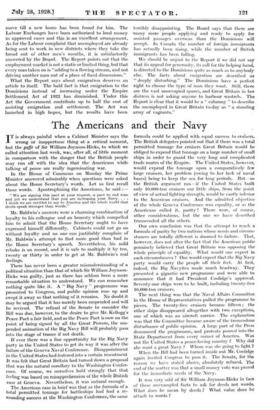The Americans
and their Navy TT is always painful when a Cabinet Minister says the -I- wrong or inopportune thing at a critical moment, but the gaffe of Sir William Joynson-Hicks, to which we called attention last week, was, after all, of little moment in comparison with the danger that the British people may run off with the idea that the Americans while talking of peace are really ingeminating war.
In the House of Commons on Monday the Prime Minister answered admirably when questions were asked about the Home Secretary's words. Let us first recall those words. Apostrophizing the Americans, he said :— " We are signing this pact at your request, a pact to end war, and yet we understand that you are increasing your Navy. . . . I think we are entitled to say to America and the whole world that deeds speak stronger than words."
Mr. Baldwin's answers were a charming combination of loyalty to his colleague and an honesty which compelled him to admit that the Home Secretary ought to have expressed himself differently. -Cabinets-could not go on without loyalty and no one can justifiably' complain of Mr. Baldwin's attempt to find more good than bad in the Home Secretary's speech. Nevertheless, his • mild rebuke is on record, and it is safe to multiply it by ten, twenty or thirty in order to get at Mr. Baldwin's real feelings.
There has never been a greater misunderstanding of a political situation than that of which Sir William Joynson- Hicks was guilty, just as there has seldom been a more remarkable situation to understand. We can remember nothing quite like it. A " Big Navy " programme was presented to Congress, and public opinion rose up and swept it away so that nothing of it remains. No doubt it may be argued that it has merely been suspended and will be revived. The refusal of the Senate to consider the Bill was due, however, to the desire to give Mr. Kellogg's Peace Pact a fair field, and as the Peace Pact is now on the point of being signed by all the Great Powers, the sus- pended animation of the Big Navy Bill will probably pass into the stage of trance if not death.
If ever there was a fine opportunity for the Big Navy party in the United States to get its way it was after the failure of the Geneva Naval Conference. Disappointment in the United States had festered into a certain resentment It was felt that Great Britain had turned down a proposal that was the natural corollary to the Washington Confer- ence. Of course, we ourselves hold strongly that that feeling was based on misapprehension of the whole British case at Geneva. Nevertheless, it was natural enough.
The American case in brief was that as the formula of a total permitted tonnage for battleships had had a re- sounding success at the Washington Conference, the same formula could be applied with equal success to cruisers. The British delegates pointed out that if there was a total permitted tonnage for cruisers Great Britain would he obliged to expend that tonnage on a large number of small ships in order to guard the very long and complicated trade routes of the Empire. The United States, however, would expend the tonnage upon a comparatively few large cruisers, her problem (owing to her lack of naval bases) being -to keep the sea for long periods. But—so the British argument ran—if the United States built only 10,000-ton cruisers our little ships, from the point of view of actual fighting strength, would be vastly inferior to the American cruisers. And the admitted objective of the whole Geneva Conference was equality, or as the Americans called it, parity ! There were, of course, other considerations, but the one we have described transcended all the others.
Our own conclusion was that the attempt to reach a formula of parity by two nations whose needs and circum- stances are totally different is doomed to failure. That, however, does not alter the fact that the American public genuinely believed that Great Britain was opposing the whole principle of equality. What would one expect in such circumstances ? One would expect that the Big Navy party would carry the people off their feet. At first, indeed, the Big Navyites made much headway. They presented a gigantic new programme and were able to announce that it had President Coolidge's approval. Seventy-one ships were to be built, including twenty-five 10,000-ton cruisers.
The next thing was that the Naval Affairs Committee in the House of Representatives pulled the programme to pieces. The twenty-five cruisers became fifteen ; the other ships disappeared altogether with two exceptions, one of which was an aircraft carrier. The explanation was that the Committee became aware of the tremendous disturbance of public opinion. A large part of the Press denounced the programme, and protests poured into the State Department from every corner of America. Was not the United States a peace-loving country ? Why did she want a great Navy ? Whom was she going to fight ?
When the Bill had been turned inside out Mr. Coolidge again invited Congress to pass it. The Senate, for the reason we have stated above, absolutely refused. The end of the matter was that a small money vote was passed for the immediate needs of the Navy: It was very odd of Sir William Joynson-Hicks in face of these unexampled facts to ask for deeds not words, What does he mean by deeds ? What value does he attach to words ?




































 Previous page
Previous page